In my last commentary, I discussed the Summit of the Group of 77 plus China, held in Havana on September 15-16, 2023. I reviewed the key concepts and proposals of the Declaration of Havana, approved by proclamation by the Summit and released by the Cuban Ministry of Foreign Affairs on September 16. In addition, I emphasized a theme that I had discerned during the two days of speeches by the heads of state, emerging particularly from the representatives of the poorest nations. Namely, the need for scientific and technological development as the foundation for economic development, attained through South-South cooperation; and attained by the peoples of the South by and for themselves, no longer expecting cooperation from the North. See “Havana: Capital of the Global South: Technological development of, by, and for the South,” September 20, 2023.
Today, I continue to review the discourses at the Summit, selecting some of the more notable leaders of the Global South.



